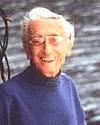 (source)
(source)
|
Jacques-Yves Cousteau
(11 Jun 1910 - 25 Jun 1997)
French naval officer, oceanographer, marine biologist and ocean explorer who co-invented the aqualung, and various equipment for underwater filming of his extensive investigations throughout the world’s oceans.
|
Science Quotes by Jacques-Yves Cousteau (48 quotes)
[Antarctica has 90 percent of the world’s ice, and God help us if it melts,] whales will be swimming in the streets of New York.
— Jacques-Yves Cousteau
From address (20 Sep 1989) to the National Press Club, as quoted in Phil McCombs, The Washington Post (21 Sep 1989).
[Reading a cartoon story,] the boy favored reading over reality. Adults might have characterized him in any number of negative ways—as uninquisitive, uninvolved, apathetic about the world around him and his place in it. I’ve often wondered: Are many adults much different when they read the scriptures of their respective faiths?
— Jacques-Yves Cousteau
In Jacques Cousteau and Susan Schiefelbein, The Human, the Orchid, and the Octopus: Exploring and Conserving Our Natural World (2007), 117.
About two-thirds of the oxygen in our atmosphere is produced in the surface waters of the sea by phytoplankton, the minute forms of algae that give the sea its slightly green hue, and which initiate the entire food web of the ocean.
— Jacques-Yves Cousteau
In 'Ocean Policy and Reasonable Utopias', The Forum (Summer 1981), 16, No. 5, 899-900.
Applied research generates improvements, not breakthroughs. Great scientific advances spring from pure research. Even scientists renowned for their “useful” applied discoveries often achieved success only when they abandoned their ostensible applied-science goal and allowed their minds to soar—as when Alexander Fleming, “just playing about,” refrained from throwing away green molds that had ruined his experiment, studied them, and discovered penicillin. Or when C. A. Clarke, a physician affiliated with the University of Liverpool, became intrigued in the 1950s by genetically created color patterns that emerged when he cross-bred butterflies as a hobby. His fascination led him—“by the pleasant route of pursuing idle curiosity”—to the successful idea for preventing the sometimes fatal anemia that threatened babies born of a positive-Rhesus-factor father and a negative-Rhesus-factor mother.
— Jacques-Yves Cousteau
In Jacques Cousteau and Susan Schiefelbein, The Human, the Orchid, and the Octopus: Exploring and Conserving Our Natural World (2007), 214-215.
At the origin, the [space travel] pioneers of the greatest adventure of all times were motivated by the drive to explore, by the pure spirit of conquest, by the lofty desire to open up new fields to human genius. … From their exceptional journeys, they all came back with the revelation of beauty. Beauty of the black sky, beauty and variety of our planet, beauty of the Earth seen from the Moon, girdled by a scintillating belt of equatorial thunderstorms. They all emphasize that our planet is one, that borderlines are artificial, that humankind is one single community on board spaceship Earth. They all insist that this fragile gem is at our mercy and that we must all endeavor to protect it.
— Jacques-Yves Cousteau
Written for 'Foreword' to Kevin W. Kelley (ed.), The Home Planet (1988), paragraphs 6-7 (unpaginated).
Buoyed by water, he can fly in any direction—up, down, sideways—by merely flipping his hand. Under water, man becomes an archangel.
— Jacques-Yves Cousteau
Quoted in 'Sport: Poet of the Depths', Time (28 Mar 1960)
Far from attempting to control science, few among the general public even seem to recognize just what “science” entails. Because lethal technologies seem to spring spontaneously from scientific discoveries, most people regard dangerous technology as no more than the bitter fruit of science, the real root of all evil.
— Jacques-Yves Cousteau
In Jacques Cousteau and Susan Schiefelbein, The Human, the Orchid, and the Octopus: Exploring and Conserving Our Natural World (2007), 181.
Fish does not now—nor can it ever—feed the world. … Many developed, wealthy nations … dine on seafood more for taste than for necessity. … not one would on average incur any protein deficiency even if fish were completely removed from its dinner tables.
— Jacques-Yves Cousteau
In Jacques Cousteau and Susan Schiefelbein, The Human, the Orchid, and the Octopus: Exploring and Conserving Our Natural World (2007), 153.
For most of history, man has had to fight nature to survive; in this century he is beginning to realize that, in order to survive, he must protect it.
— Jacques-Yves Cousteau
…...
From birth, man carries the weight of gravity on his shoulders. He is bolted to earth. But man has only to sink beneath the surface and he is free.
— Jacques-Yves Cousteau
Quoted in 'Sport: Poet of the Depths', Time (28 Mar 1960)
Human blood is a testament to life’s origin in the ocean: its chemical composition is nearly identical to that of sea-water.
— Jacques-Yves Cousteau
In 'Ocean Policy and Reasonable Utopias', The Forum (Summer 1981), 16, No. 5, 900.
I am absolutely enraptured by the atmosphere of a wreck. A dead ship is the house of a tremendous amount of life—fish and plants. The mixture of life and death is mysterious, even religious. There is the same sense of peace and mood that you feel on entering a cathedral.
— Jacques-Yves Cousteau
Quoted in 'Sport: Poet of the Depths', Time (28 Mar 1960)
I experimented with all possible maneuvers—loops, somersaults and barrel rolls. I stood upside down on one finger and burst out laughing, a shrill, distorted laugh. Nothing I did altered the automatic rhythm of the air. Delivered from gravity and buoyancy, I flew around in space.
Describing his early test (1943) in the Mediterranean Sea of the Aqua-Lung he co-invented.
Describing his early test (1943) in the Mediterranean Sea of the Aqua-Lung he co-invented.
— Jacques-Yves Cousteau
Quoted in 'Sport: Poet of the Depths', Time (28 Mar 1960)
If we consider our earth as a spaceship and the earthly astronauts as the crew of that spaceship, I would say wars can be analogous to mutinies aboard the ship.
— Jacques-Yves Cousteau
From Testimony to Third Plenary Session (28 Jan 1971). In Panel on Science and Technology, Twelfth Meeting, International Science Policy, Proceedings before the Committee on Science and Astronautics, U.S. House of Representatives, Jan. 26, 27, and 28, 1971. No. 1 (1971), 330.
In 1946 [we visited] a rock called Le Veyron, around which sea life swarmed … an undersea paradise.… About thirty years later I returned … to the same depth, to the same caves, at the same time of year. The grotto was empty. Not one single fish lived among the rocks. The verdant gardens were gone.…
When I saw Le Veyron, I believed that the sea’s most monstrous force doesn’t live in Loch Ness. It lives in us.
When I saw Le Veyron, I believed that the sea’s most monstrous force doesn’t live in Loch Ness. It lives in us.
— Jacques-Yves Cousteau
In Jacques Cousteau and Susan Schiefelbein, The Human, the Orchid, and the Octopus: Exploring and Conserving Our Natural World (2007), 40-41.
In the 1860s, Pasteur not only applied his germ theory to create “Pasteurization,” rescuing France’s wine and vinegar industries, but also found both the cause and cure of silkworm disease, saving growers millions of dollars. When Napoleon asked the scientist why he had not legitimately profited by his findings, Pasteur replied: “In France scientists would consider they lowered themselves by doing so.”
— Jacques-Yves Cousteau
In Jacques Cousteau and Susan Schiefelbein, The Human, the Orchid, and the Octopus: Exploring and Conserving Our Natural World (2007), 190.
In the heat of the sun, the ocean is the boiler and condenser of a gigantic steam engine, a weather engine that governs crops, floods, droughts, frosts, hurricanes.
— Jacques-Yves Cousteau
In 'Ocean Policy and Reasonable Utopias', The Forum (Summer 1981), 16, No. 5, 900.
It has been calculated that when a factory saves some money by polluting the environment, it costs the citizens living in the vicinity ten times more than it saves the factory.
— Jacques-Yves Cousteau
In 'Ocean Policy and Reasonable Utopias', The Forum (Summer 1981), 16, No. 5, 898
It is fashionable nowadays to talk about the endless riches of the sea. The ocean is regarded as a sort of bargain basement, but I don’t agree with that estimate. People don’t realize that water in the liquid state is very rare in the universe. Away from earth it is usually a gas. This moisture is a blessed treasure, and it is our basic duty, if we don’t want to commit suicide, to preserve it.
— Jacques-Yves Cousteau
As quoted by Nancy Hicks in 'Cousteau’s Philosophy of the Sea Helps Him Get Another Medal', New York Times (25 Oct 1970), 54.
Learning science, learning about nature, is more than the mere right of taxpayers; it is more than the mere responsibility of voters. It is the privilege of the human being.
— Jacques-Yves Cousteau
In Jacques Cousteau and Susan Schiefelbein, The Human, the Orchid, and the Octopus: Exploring and Conserving Our Natural World (2007), 202.
Like most fathers, by clear star-studded skies I used to take each of my two little boys in my arms for a glimpse at infinity. The splendor of the unreachable silenced their chatterboxes for a few seconds. They raised their arms and closed their little fingers in a futile attempt to grasp one of the twinkling sparks that dot our dreams. The little fellows obeyed the command reported by Ovid: “God elevated man's forehead and ordered him to contemplate the stars.”
— Jacques-Yves Cousteau
Written as opening paragraph for 'Foreword' to Kevin W. Kelley (ed.), The Home Planet (1988) (unpaginated).
Mere infants of the universe, with no feel for infinity, no sense of place in time and space, we human beings have yet to comprehend the enormity of what we are doing: In a geological second, we are unraveling complexities it took eternity to create.
— Jacques-Yves Cousteau
In Jacques Cousteau and Susan Schiefelbein, The Human, the Orchid, and the Octopus: Exploring and Conserving Our Natural World (2007), 107.
Only the applied scientist sets out to find a “useful” pot of gold. The pure scientist sets out to find nothing. Anything. Everything. The applied scientist is a prospector. The pure scientist is an explorer.
— Jacques-Yves Cousteau
In Jacques Cousteau and Susan Schiefelbein, The Human, the Orchid, and the Octopus: Exploring and Conserving Our Natural World (2007), 181.
Poisoning water is an assassination.
— Jacques-Yves Cousteau
Statement to the Twelfth Meeting With the Panel on Science and Technology (28 Jan 1971), printed in Proceedings Before the Committee on Science and Astronautics, U.S. House of Representatives, Ninety-Second Congress, First Session, No. 1, (1971), 326.
Pollution of the air or of the land all ultimately ends up in the sea.
— Jacques-Yves Cousteau
In 'Ocean Policy and Reasonable Utopias', The Forum (Summer 1981), 16, No. 5, 897
Science and poetry are, in fact, inseparable. By providing a vision of life, of Earth, of the universe in all its splendor, science does not challenge human values; it can inspire human values. It does not negate faith; it celebrates faith.
— Jacques-Yves Cousteau
In Jacques Cousteau and Susan Schiefelbein, The Human, the Orchid, and the Octopus: Exploring and Conserving Our Natural World (2007), 201.
Technocrats are turning us into daredevils. The haphazard gambles they are imposing on us too often jeopardize our safety for goals that do not advance the human cause but undermine it. By staking our lives on their schemes, decision makers are not meeting the mandate of a democratic society; they are betraying it. They are not ennobling us; they are victimizing us. And, in acquiescing to risks that have resulted in irreversible damage to the environment, we ourselves are not only forfeiting our own rights as citizens. We are, in turn, victimizing the ultimate nonvolunteers: the defenseless, voiceless—voteless—children of the future.
— Jacques-Yves Cousteau
In Jacques Cousteau and Susan Schiefelbein, The Human, the Orchid, and the Octopus: Exploring and Conserving Our Natural World (2007), 85.
The acquired [space exploration] technology has immediately been aimed at practical and profitable applications: worldwide communications, global positioning systems for ships and aircraft, and remote sensing to better know our planet and monitor its resources and to trace migrations of whales, fish, and birds. Unfortunately, it is now almost monopolized by the military.
— Jacques-Yves Cousteau
Written for 'Foreword' to Kevin W. Kelley (ed.), The Home Planet (1988), paragraph 5 (unpaginated).
The famous set of pictures taken from the moon, [celebrate] the birth of a global consciousness that will help build a peaceful future for humankind. That future is in the hands of those who dedicate their lives to explore Teilhard de Chardin’s three infinities: the infinitely big, the infinitely small, and the infinitely complex. And from all the beauty they discover while crossing perpetually receding frontiers, they develop for nature and for humankind an infinite love.
— Jacques-Yves Cousteau
From concluding paragraph written for 'Foreword' to Kevin W. Kelley (ed.), The Home Planet (1988), paragraph 8 (unpaginated).
The infinite variations in the ways creatures fulfill the same requirement—to fuel energy needs—constantly astound me. Booby birds and pelicans … actually performed underwater dives, descending some twenty feet below the surface and then flapping their wings to fly through water. Totally encrusted with tiny diamond bubbles—like the jeweled nightingales of Asian emperors—they soared around below for nearly half a minute.
— Jacques-Yves Cousteau
In Jacques Cousteau and Susan Schiefelbein, The Human, the Orchid, and the Octopus: Exploring and Conserving Our Natural World (2007), 282.
The problem of modern democracy is not that the people have lost their power, but that they have lost their appreciation for the extraordinary power they wield. Consider one astonishing truth: Famine has never struck a democracy.
— Jacques-Yves Cousteau
In Jacques Cousteau and Susan Schiefelbein, The Human, the Orchid, and the Octopus: Exploring and Conserving Our Natural World (2007), 102.
The pure scientist discovers the universe. The applied scientist exploits existing scientific discoveries to create a usable product.
— Jacques-Yves Cousteau
In Jacques Cousteau and Susan Schiefelbein, The Human, the Orchid, and the Octopus: Exploring and Conserving Our Natural World (2007), 181.
The reason I have made films about the undersea lies simply is my belief that people will protect what they love. Yet we love only what we know.
— Jacques-Yves Cousteau
In Jacques Cousteau and Susan Schiefelbein, The Human, the Orchid, and the Octopus: Exploring and Conserving Our Natural World (2007), 202.
The reason I love the sea I cannot explain - it’s physical. When you dive you begin to feel like an angel. It’s a liberation of your weight.
— Jacques-Yves Cousteau
…...
The sea is the universal sewer where all kinds of pollution end up conveyed by rain from the atmosphere and from the mainland.
— Jacques-Yves Cousteau
Statement in testimony to the Twelfth Meeting With the Panel on Science and Technology (28 Jan 1971), printed in Proceedings Before the Committee on Science and Astronautics, U.S. House of Representatives, Ninety-Second Congress, First Session, No. 1 (1971), 325.
The sea, once it casts its spell, holds one in its net of wonder forever.
— Jacques-Yves Cousteau
In Life and Death in a Coral Sea (1971), 13.
The survival of our species, he said, is linked to the survival of our thoughts.
— Jacques-Yves Cousteau
In Jacques Cousteau and Susan Schiefelbein, The Human, the Orchid, and the Octopus: Exploring and Conserving Our Natural World (2007), 20.
There was wildlife, untouched, a jungle at the border of the sea, never seen by those who floated on the opaque roof.
Describing his early experience, in 1936, when a fellow naval officer, Philippe Tailliez, gave him goggles to see below the Mediterranean Sea surface.
Describing his early experience, in 1936, when a fellow naval officer, Philippe Tailliez, gave him goggles to see below the Mediterranean Sea surface.
— Jacques-Yves Cousteau
Quoted in 'Sport: Poet of the Depths', Time (28 Mar 1960)
Thus I learned the single essential to qualify a dive as successful: a return.
— Jacques-Yves Cousteau
In Jacques Cousteau and Susan Schiefelbein, The Human, the Orchid, and the Octopus: Exploring and Conserving Our Natural World (2007), 38.
Today, when so much depends on our informed action, we as voters and taxpayers can no longer afford to confuse science and technology, to confound “pure” science and “applied” science.
— Jacques-Yves Cousteau
In Jacques Cousteau and Susan Schiefelbein, The Human, the Orchid, and the Octopus: Exploring and Conserving Our Natural World (2007), 181.
True, no one can absolutely control the direction of his life; but each person can certainly influence it. The armchair explorers who complain that they never got their “one lucky shot” were never really infected by the incurable drive to explore. Those who have the bug—go.
— Jacques-Yves Cousteau
In Jacques Cousteau and Susan Schiefelbein, The Human, the Orchid, and the Octopus: Exploring and Conserving Our Natural World (2007), 32.
Truly, we do live on a “water planet.” For us, water is that critical issue that we need. It’s the most precious substance on the planet, and it links us to pretty much every environmental issue, including climate change, that we’re facing.
— Jacques-Yves Cousteau
From interview by Kathleen Walter, Newsmax (28 Sep 2009).
We must plant the sea and herd its animals … using the sea as farmers instead of hunters. That is what civilization is all about—farming replacing hunting.
— Jacques-Yves Cousteau
Epigraph for Robin Neill, 'Aquaculture Property Rights in Canada', in Nicholas Schneider (ed.), A Breath of Fresh Air: The State of Environmental Policy in Canada (2008), 180.
We never attempted to decipher the meaning of life; we wanted only to testify to the miracle of life.
— Jacques-Yves Cousteau
In Jacques Cousteau and Susan Schiefelbein, The Human, the Orchid, and the Octopus: Exploring and Conserving Our Natural World (2007), 39.
What is a scientist after all? It is a curious man looking through a keyhole, the keyhole of nature, trying to know what’s going on.
— Jacques-Yves Cousteau
In Christian Science Monitor (21 July 1971). As cited in Michael C. Thomsett, Linda Rose Thomsett, A Speaker's Treasury of Quotations: Maxims, Witticisms and Quips for Speeches and Presentations (2009), 102.
When I needed an apparatus to help me linger below the surface of the sea, Émile Gagnan and I used well-known scientific principles about compressed gases to invent the Aqualung; we applied science. The Aqualung is only a tool. The point of the Aqualung—of the computer, the CAT scan, the vaccine, radar, the rocket, the bomb, and all other applied science—is utility.
— Jacques-Yves Cousteau
In Jacques Cousteau and Susan Schiefelbein, The Human, the Orchid, and the Octopus: Exploring and Conserving Our Natural World (2007), 181.
When scientists discovered that liquid water, which brought forth life on Earth, exists nowhere else in great quantities in the solar system, the most significant lesson they taught was not that water, or the life that depends on it, is necessarily the result of some chemical accident in space; their most important revelation was that water is rare in infinity, that we should prize it, preserve it, conserve it.
— Jacques-Yves Cousteau
In Jacques Cousteau and Susan Schiefelbein, The Human, the Orchid, and the Octopus: Exploring and Conserving Our Natural World (2007), 201-202.
Without ethics, everything happens as if we were all five billion passengers on a big machinery and nobody is driving the machinery. And it’s going faster and faster, but we don’t know where.
— Jacques-Yves Cousteau
From CNN interview (24 Feb 1989). As quoted and cited in Murtezan Ismaili, 'Perceptions of Ethics at Education in University Level', Procedia Social and Behavioral Sciences (2011), 15, 1125.
Quotes by others about Jacques-Yves Cousteau (1)
Like my father and grandfather, Philippe and Jacques-Yves Cousteau, I’ve dedicated my life to exploring and protecting our seas, in large part through documentary film.
In 'Ocean Oases: Protecting Canyons & Seamounts of the Atlantic Coast', The Huffington Post (8 Jun 2011).
See also:
- 11 Jun - short biography, births, deaths and events on date of Cousteau's birth.
- Jacques-Yves Cousteau - context of quote “Bolted to earth” - Medium image (500 x 250 px)
- Jacques-Yves Cousteau - context of quote “Bolted to earth” - Large image (800 x 400 px)
- Jacques-Yves Cousteau - context of quote “Enraptured by the atmosphere of a wreck” - Medium image (500 x 250 px)
- Jacques-Yves Cousteau - context of quote “Enraptured by the atmosphere of a wreck” - Large image (800 x 400 px)
- Jacques-Yves Cousteau - context of quote “Water in the liquid state is very rare in the universe” - Medium image (500 x 250 px)
- Jacques-Yves Cousteau - context of quote “Water in the liquid state is very rare in the universe” - Large image (800 x 400 px)
- Jacques Cousteau's Calypso, by Jacques Yves Cousteau. - book suggestion.
- Booklist for Jacques Yves Cousteau.
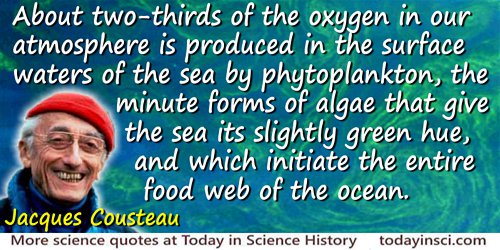
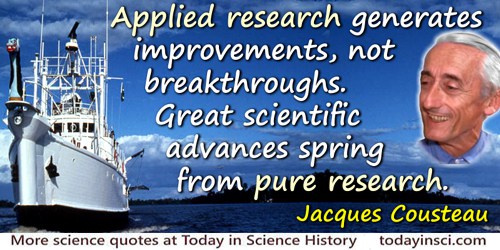
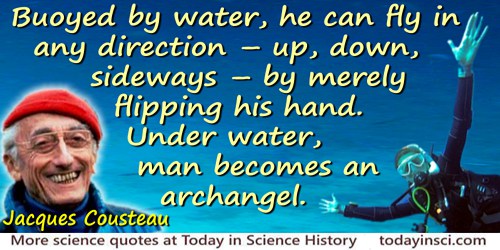
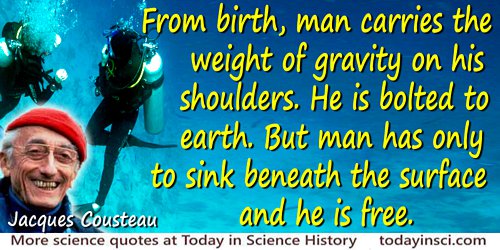
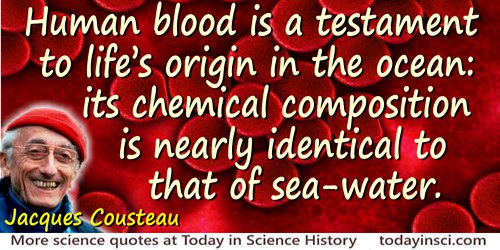
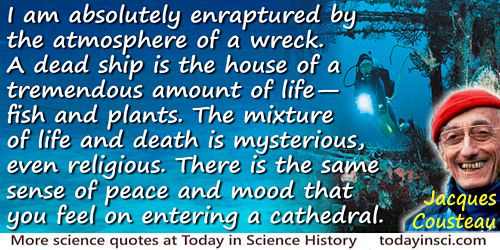
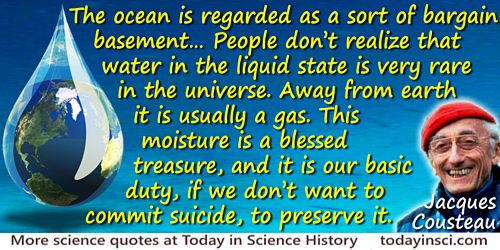
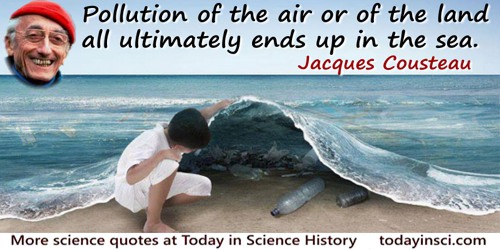
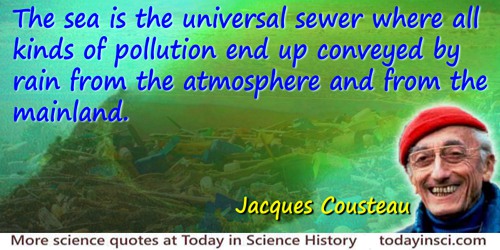
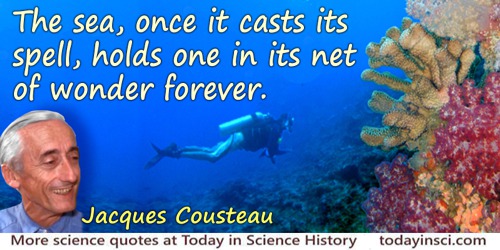
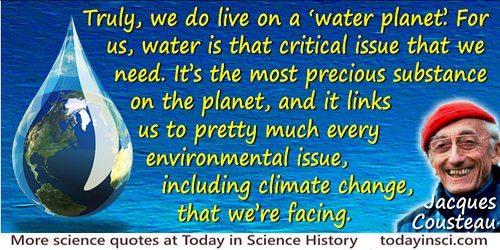
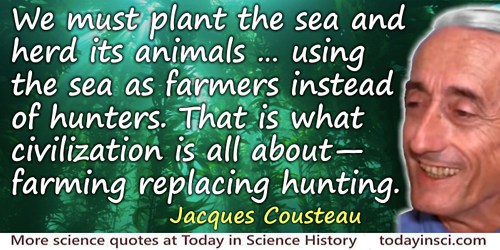
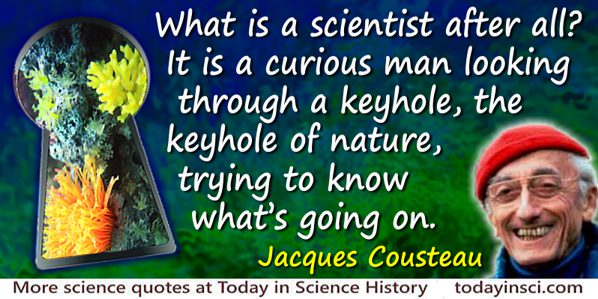
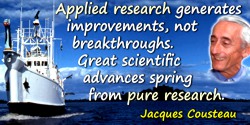
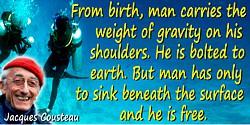
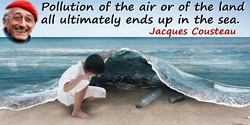
 In science it often happens that scientists say, 'You know that's a really good argument; my position is mistaken,' and then they would actually change their minds and you never hear that old view from them again. They really do it. It doesn't happen as often as it should, because scientists are human and change is sometimes painful. But it happens every day. I cannot recall the last time something like that happened in politics or religion.
(1987) --
In science it often happens that scientists say, 'You know that's a really good argument; my position is mistaken,' and then they would actually change their minds and you never hear that old view from them again. They really do it. It doesn't happen as often as it should, because scientists are human and change is sometimes painful. But it happens every day. I cannot recall the last time something like that happened in politics or religion.
(1987) -- 


